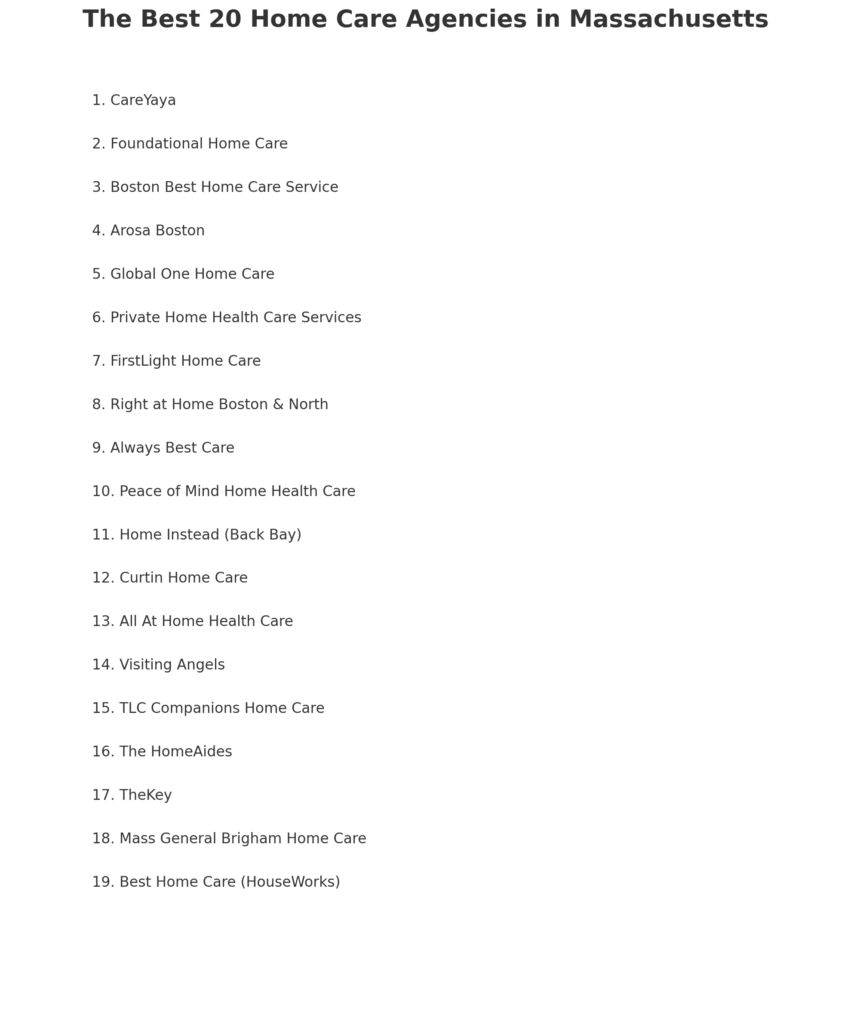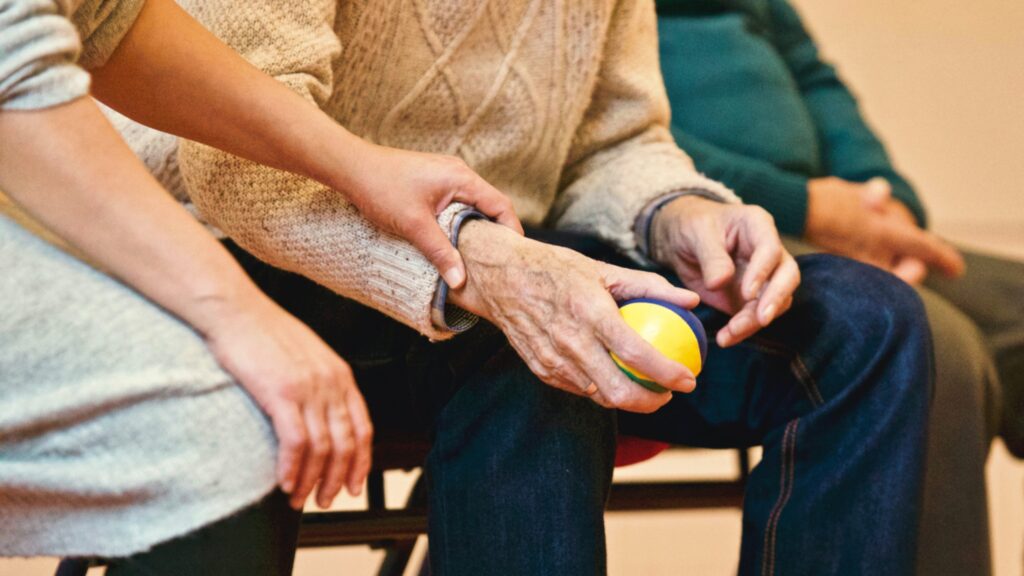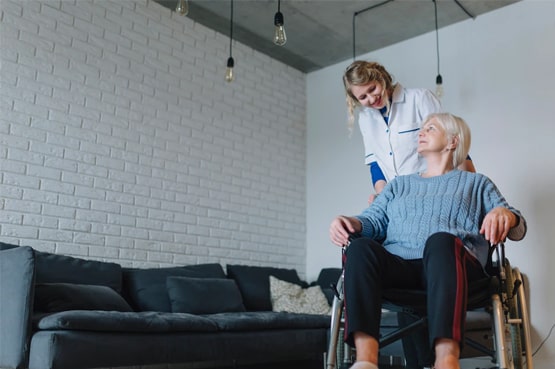The Best 20 Home Care Agencies in Massachusetts
This guide provides a detailed overview of 20 top home care agencies in MA, highlighting their unique strengths, specialized services, and what families and caregivers value most.
Choosing home care for a loved one in Boston means you’ve got a lot of excellent choices.
This guide simplifies your search. It gives you key information about 20 top home care agencies in MA, highlighting their unique strengths and specialized services. You’ll see what families and caregivers value most about each.
If your family is seeking a private home care agency a home healthcare agency in Massachusetts, this list helps you discover comprehensive home care services in Massachusetts that truly meet your needs.

1. CareYaya (Boston)
CareYaya is different because it pairs local college students (from schools like Harvard and BU) with seniors who need support, so caregivers are young, energetic, and pre-health majors who’ve passed rigorous background checks and interviews.
Families love that the pay goes straight to the student, no agency fees, meaning more value (they charge around $15–18/hr).
There’s an app to request care instantly, perfect if you need someone tomorrow morning. Caregivers also earn ratings after each visit, so quality is tracked and issues get fixed fast.
One Boston mom said, “it was really nice to get to know her one-on-one…I was a little nervous…she was really welcoming,” showing how these students build real connections. Check them out here: careyaya.org.
2. Foundational Home Care (Newton/Boston)
Foundational stands out because they match personality, not just credentials, they ask what matters most to your loved one and find a caregiver who truly fits. They’re available 24/7, ready for needs that pop up at 2 AM or 2 PM.
One family shared, “the caregiver assist my parent with meal preparation…my mom really liked the caregiver and wanted me to give a big recommendation.” Caregivers are taught that “above and beyond” is not optional, it’s expected.
The agency puts communication front and center, you’re looped in every step. You can learn more at seniorhomes.com where they’re praised for exceptional care.
3. Boston Best Home Care Service, Inc. (Roslindale)
Boston Best is a family-owned business with an A+ BBB rating since 2018, which is rare for small agencies. Their manager, Gina, often steps into homes personally, not just emails, families say they immediately felt comforted by Gina’s presence.
Reviews mention, “They treated my mom like family…picked up on her needs quickly…and made great suggestions on how we could make things easier.” They’re skilled in dementia and live-in care, tailoring services that preserve dignity.
Clients say the team “has added quality years to my Mom’s life,” which speaks volumes.
4. Arosa Boston (Newton)
What makes Arosa special is its concierge nursing program, where registered nurses oversee care alongside personal caregivers, so someone always knows the medical side of things. Caregivers say they get great training in a supportive atmosphere, and managers work hard to build trusting relationships.
Clients say, “excellent services from a kind, caring, and knowledgeable staff,” reinforcing this quality culture. Their flexible scheduling lets caregivers step in even at short notice, which is a huge relief for families in crisis.
Arosa started in 2011 and has refined its integrated, compassionate nursing model ever since. See their approach here: arosacare.com.
5. Global One Home Care (Boston)
Global One Home Care provides care for families in Boston, Methuen and has now a branch in New Hampshire as well.
With 4.9★ reviews on Google, companionship care, personal care assistance, light housekeeping and dementia care are on the top of their services, provided strictly by certified and properly vetted caregivers resident in the city.
The agency is Black-owned and proudly hires immigrant caregivers who have state certifications, families in liberal areas appreciate the diversity and community focus. You can learn more about their team and the qualifications of Our certified caregivers on their website.
They’re affiliated to some of the city’s largest care networks such as the Massachusetts Care Alliance speaking to their credibility.
They offer unique services like in-home pedicure services, representing a focus on dignity and comfort. For loved ones living with dementia or Alzheimer’s, Global One Home Care provides specialized dementia care support, offering memory support and meaningful engagement.
If continuous support is needed, Global One Home Care offers 24/7 live-in care, ensuring someone is by your loved one’s side at all times.
Early reviews say the caregiver was “phenomenal…devoted and loving” during their loved one’s final months. Their fresh, modern website makes it easy to find services, read reviews, and feel confident.
This is one of the distinct private home care agencies available.
6. Private Home Health Care Services LLC (Charlestown)
This Charlestown-based boutique agency is known for filling gaps, like sudden appointments or overnight needs, so families aren’t scrambling. With a 4.8★ rating, reviews say staff “went above and beyond,” not just punctual, but caring and professional.
Because it’s small, owners stay close to each caregiver and client, creating real accountability. Every caregiver is bonded and insured, reducing the stress of hiring.
Caregivers on job sites say they enjoy flexible schedules and overtime opportunities, which helps with continuity of care. Families say it’s a relief to have a responsive, no-fuss partner in care. This is an example of private home health care.
For families considering a private home care agency in Massachusetts, it’s important to understand potential considerations, such as the risks of private caregivers.
7. FirstLight Home Care (West Suburban & Boston Northwest)
FirstLight is a top-rated local franchise with more than 60 five-star reviews from Boston-area clients. Their approach is personal, families say caregivers bring “life and laughter” to dementia patients, showing real warmth and understanding from day one.
They also offer flexible schedules, from a few hours to 24/7 care, ideal for families whose needs change often. The agency is recognized for high-quality dementia and transitional care.
Plus, they won awards as a “Best of Home Care” employer, meaning happy caregivers tend to stay, which is great for consistent care. You can learn more at firstlighthomecare.com.
8. Right at Home – Boston & North (Somerville/Malden)
Right at Home is a trusted 20-year-old local franchise that blends caregiver compassion with strong training in memory care. Families say caregivers are “exceptional” in teaching clients and dealing with dementia-related challenges, bringing dignity back to daily routines.
Staff are praised for professionalism, kindness, and good communication, “always returning phone calls timely.”
The agency is certified by Home Care Pulse and earned “Employer of Choice” status, meaning caregivers are supported, and clients benefit from that stability. They also serve Parkinson’s and Alzheimer’s families, so they know how to personalize care for these conditions.
Explore their services at rightathome.net. This is a well-regarded home care agency in Massachusetts.
9. Always Best Care (Belmont/Boston)
Always Best Care Belmont is top-rated, 5.0 stars with 75+ reviews, showing consistent excellence. The local team offers free assisted living placement help, guiding families even when home care may no longer be enough. Caregivers and nurses are praised by name; Kathy the coordinator and Nurse Beth are called “perfect fits” and “incredible assets.”
The Belmont office has strong caregiver retention, employees say management recognizes and values them, which supports better care continuity. It’s a franchise that feels deeply local and heartfelt for families around Boston. For more details, visit alwaysbestcare.com
10. Peace of Mind Home Health Care (Jamaica Plain & Winchester)
Peace of Mind is Irish-owned with over 27 years in business, giving it deep Boston-area roots and trust. They’re licensed, bonded, and insured, and caregivers are employees, not contractors, so families get consistency.
One long-term family described their caregivers as “compassionate, professional…and I would certainly recommend the agency” after four years of care.
Caregivers appreciate the flexible schedules, and many return as alumni, which means experienced, caring staff for clients. They offer 24/7 support across Jamaica Plain and Winchester, making them a dependable partner in any situation. Learn more at peaceofmindinc.com.
This is a strong example of home care Massachusetts.
11. Home Instead (Boston – Back Bay)
Home Instead is a larger franchise but shines in dementia care training, with online and in-person mentoring by RNs. A family said, “They’ve been with us every step of the way” through dementia progression, showing commitment and care.
They also have a reputation for loving caregivers who build real bonds, an example, Zahra, was called “a pleasure” by a grateful client. Caregivers report they learned how to truly empathize and respond to evolving needs, which helps strengthen quality support.
Offering 24-hour and live-in care, Home Instead is a well-structured choice with robust resources. Visit homeinstead.com/boston-ma for more information. This provides excellent in-home care Massachusetts.
12. Curtin Home Care (Boston)
Curtin is a skilled nursing-focused private-care agency recently acquired by Nova Leap, offering clinical depth within a boutique firm. Unlike many non-medical agencies, they provide care by RNs, LPNs, and CNAs under clinical oversight. Clients say Curtin was “Boston’s choice for private in-home care” with a smooth transition during the Nova Leap integration.
Nova Leap adds expanded resources and consistent payment structure, helping caretakers stabilize scheduling and pay. Families dealing with complex care needs, like post-surgery, feeding tubes, or hospice, get both compassion and clinical confidence.
You can find more at curtinhomecare.com. This is a key private home care agency in MA.
13. All At Home Health Care (Brighton/Boston & statewide)
All At Home offers a full clinical spectrum, skilled nursing, speech or physical therapy, psychiatric nursing, right alongside personal care. In independent surveys, 94% of patients said care was professional, and 96% said medicines and safety were discussed, above MA and national averages.
Families appreciate how caregivers stay “by their side through thick and thin” during tough health challenges. They even help relatives earn tax-free stipends for caregiving through programs they run.
Wide coverage across MA makes them a one-stop solution for families spanning different regions. Discover more at allathomehealthcare.com. This is among the reliable home health agencies MA.
14. Visiting Angels (Newton/Canton serving Boston)
Visiting Angels has been serving Greater Boston since 2004 and has earned the “Best of Home Care” awards from Home Care Pulse, six years in a row for excellence in leadership, service, and as an employer.
Their caregivers are trained in dementia and Alzheimer’s care, with case managers certified by the National Council of Certified Dementia Practitioners.
Families often say things like, “The matching caregiver was a match made in heaven” and “They helped my mother so I could go to work daily.” They’re available 24/7, even with backup caregivers on call for emergencies.
Many caregivers are trained in safe transfers using Hoyer lifts and have hands-on mobility training. Learn more at VisitingAngels.com/Boston.
15. TLC Companions Home Care (Boston)
TLC is a small, family-run agency praised for its 24/7 support, a daughter shared, “Janeen and Lori were there for us, like family” when her mother needed constant care.
Clients rave, “Care was outstanding…continued even during COVID and after my father passed away,” demonstrating true commitment. Caregivers are background checked, bonded, and well-trained in dementia care.
They’re accredited by the BBB with an A+ rating, making them very trustworthy. TLC is also praised by caregivers for being a great place to work, tight-knit and supportive. Learn more at tlccompanions.com.
16. The HomeAides (Boston)
Founded in 2014, The HomeAides has cared for over 3,000 families in MA and CT. They offer flexible options, hourly, overnight, live-in, and 24/7 care. Every caregiver is bonded, insured, and employees of the agency, not contractors, helping with reliability and vetting.
Families say “My dad really likes Joan” and “they are always there when needed.” They also offer a meet-and-greet before services start, which builds trust and ensures a good fit. Learn more at thehomeaides.com.
17. TheKey (Boston, Wellesley/Needham)
TheKey is often described as Boston’s “most trusted senior care experts”, with families saying, “owners and caregivers were so compassionate… I had full confidence my mother was in good hands.” They pride themselves on caregiver reliability, ensuring someone is always ready, even if a regular cancels.
While flexible and responsive, their sales process is smooth, some reported feeling slightly pushed, but families still praised the matching process. According to caregivers, the agency supports them well, with flexible schedules and competitive pay. Learn more at thekey.com. This is a strong private agency for home care.
18. Mass General Brigham Home Care (Boston)
Backed by one of the nation’s top medical institutions, this program offers Medicare-covered skilled home care, with 82% of patients rating their care 9 or 10/10, outperforming state and national averages.
75% of patients saw better mobility, a sign that care is effective, not just polite. Their survey process is thorough, with strong communication and patient engagement. Patients also report better recovery and satisfaction compared to hospital stay.
Learn more at Mass General Brigham. This is one of the leading home healthcare agencies in Massachusetts.
19. Best Home Care (HouseWorks) (Wakefield/Eastern MA)
HouseWorks has been a trusted name for over 20 years, with services in Boston and beyond. They offer both skilled nursing and non-medical personal care, keeping seniors safe and engaged.
They’re proud to support veterans, working with VA benefits and Aid & Attendance programs. Based in Wakefield, they cover not only Boston but also eastern Massachusetts and NH, offering broad geographic reach.
Founded by nurses, HouseWorks focuses on high standards and clinical expertise. Learn more at house-works.com. This agency is a key player in home care MA.
20. Home Care Alliance of Massachusetts
While not a direct service provider, the Home Care Alliance of Massachusetts is a vital resource for families seeking home care services in Massachusetts.
As a non-profit trade association, they advocate for quality home care and provide a directory of member agencies, helping families find reputable providers that adhere to high standards.
Their website offers valuable information on choosing home care and understanding regulatory requirements. This is a crucial resource for anyone looking for home care in Massachusetts.
Frequently Asked Questions (FAQ)
What is the average cost of home care in Boston?
The cost of home care in Boston can vary significantly depending on the type of care needed (e.g., personal care, skilled nursing), the number of hours, and the specific agency.
As seen with CareYaya, some agencies can charge around $20–30/hr, while others may have different pricing structures.
Learn more about the cost of home care and what influences pricing. It’s obviously best to contact home care agencies in MA directly for a personalized quote.
How do I choose the right home care agency for my loved one?
When selecting a home care agency, consider factors like the specific needs of your loved one (e.g., dementia care, post-surgical support), the agency’s reputation (BBB ratings, reviews), caregiver qualifications and training, communication practices, and flexibility in scheduling.
Agencies like Foundational Home Care focus on personality matching, while others like Arosa Boston offer a concierge nursing program. Look for a home care agency in Massachusetts that aligns with your specific requirements.
Are home caregivers typically employees or contractors?
This varies by agency. Some agencies, like Peace of Mind Home Health Care and The HomeAides, hire caregivers as employees, which often means more consistent vetting and oversight. Others might use independent contractors.
It’s a good question to ask when you are interviewing agencies to ensure you find the best private home care services.
What should I look for in a caregiver’s qualifications?
Look for caregivers who are trained and certified for the specific needs of your loved one (e.g., dementia care, safe transfers).
Many agencies, such as Home Instead and Visiting Angels, highlight their specialized training programs for caregivers. Rigorous background checks and interviews are also crucial, as emphasized by CareYaya.
Can home care services assist with medical needs?
Yes, many home care agencies offer skilled nursing services alongside personal care. Agencies like Curtin Home Care and Mass General Brigham Home Care specialize in clinical oversight and provide care by RNs, LPNs, and CNAs for more complex medical needs.
All At Home Health Care also offers a full spectrum of clinical services, making them part of the home health agencies MA landscape.
Final Thoughts
Every agency we’ve mentioned here offers something valuable, they’re all doing legitimate work, and that’s important to recognize.
However, if what you’re truly seeking is that personal touch, that sense of a team genuinely in tune with your family’s rhythm, then Global One Home Care deserves a serious look.
They’re on the smaller side, which often means they can dedicate more focused attention to each family. What really sets them apart is the fact that they prioritize having caregivers ready for those sudden needs, offering real peace of mind.
It’s this commitment to personalized connection and reliable, responsive support that makes Global One Home Care a standout option when you’re weighing all the possibilities for in-home care.




























